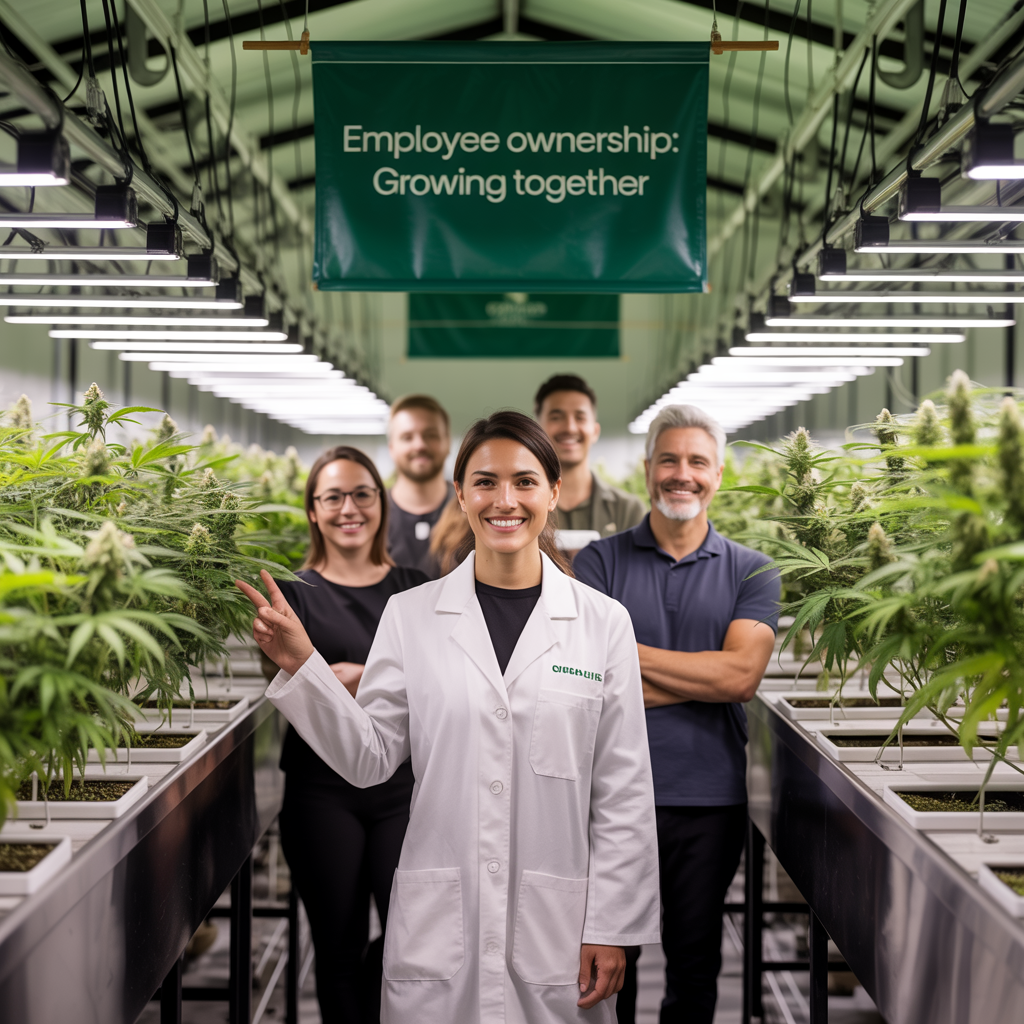Employee ownership is emerging as a strategic solution for cannabis companies, offering tax relief, cultural benefits, and sustainable growth amid regulatory challenges.
In an industry where ingenuity is often the only way forward, cannabis companies are turning to a model that not only eases their tax burdens but reshapes their entire internal culture. Employee ownership, once seen as a niche mechanism for boutique firms, is now being leveraged as a strategic pillar of sustainability, particularly as businesses wrestle with the crippling effects of Section 280E and a regulatory structure that feels more like a labyrinth than a ladder.
This isn’t a workaround born from desperation—it’s an intentional shift in how cannabis companies operate, grow and exit. With federal reform on ice and consolidation pressuring independents, Employee Stock Ownership Plans (ESOPs) are fast becoming one of the few tools in the cannabis operator’s toolbox that provide both long-term viability and immediate financial relief.
The Cannabis Industry’s Ongoing Dilemma
The modern cannabis market is a study in contradiction. Sales figures skyrocket, innovation flourishes, and retail environments become more sophisticated by the month. At the same time, businesses remain shackled by antiquated tax policies and federal-state contradictions that put them at odds with the rest of the U.S. economy.
Chief among these pain points is Section 280E of the Internal Revenue Code, which prohibits businesses that “traffic” in Schedule I substances from deducting ordinary business expenses. For cannabis operators, this essentially means paying tax on gross income, not net—an arrangement that can spike effective tax rates above 70 percent.
The result? Operators are stuck in a cycle where they sell more but earn less. Traditional routes for scaling or exiting—like private equity sales or venture-backed expansion—often come with compromises, especially for founders who want to maintain company identity or avoid corporate dilution. That’s where employee ownership begins to shift the calculus.
Maryland’s Legislative Breakthrough
When Maryland Governor Wes Moore signed legislation in 2025 that exempted ESOPs from the state’s five-year license hold requirements, it was more than a bureaucratic tweak—it was a structural shift. By carving out an ESOP exception, the state gave cannabis companies a way to transition ownership without triggering regulatory bottlenecks or waiting out the clock.
That move, subtle as it may have seemed on the surface, sent a clear signal: states can do more than wait on federal rescheduling—they can shape the future of cannabis ownership right now.
For founders, this translated into a viable path for exit without external acquisition. For employees, it opened the door to meaningful equity participation. And for the industry at large, it created a model other states could emulate. As licensing frameworks evolve and social equity goals mature, employee ownership could emerge as the fulcrum balancing fair opportunity with fiscal viability.
What an ESOP Actually Does
At its core, an ESOP is a trust-based retirement plan that holds stock on behalf of employees. Unlike issuing shares through bonuses or compensation plans, ESOPs create a structured, long-term ownership model. Employees don’t buy shares—they earn them over time based on tenure and compensation.
Here’s how it typically unfolds: the founder sells company stock to an ESOP trust. That trust becomes the shareholder, and employees receive beneficial ownership through vesting. The transaction can be funded through internal cash, seller financing, or external loans—though in the cannabis space, the last option remains complicated by federal restrictions.
Crucially, an ESOP offers significant tax advantages. If structured properly—particularly through conversion to an S-Corp with 100 percent ownership by the ESOP trust—the company becomes federally income tax-exempt. That alone removes 280E’s teeth, allowing the company to reinvest what would have otherwise gone to the IRS.
Those savings often go straight toward paying off the ESOP acquisition loan. Over time, employees build equity, and the company gains operational runway. It’s not magic—it’s smart structuring with measurable, material results.
Why Employee Ownership Works So Well in Cannabis
Cannabis is an industry driven by culture as much as capital. Customer loyalty is often tied to authentic, localized experiences and trusted staff. Retaining trained, informed employees is just as important as product quality. ESOPs offer a way to anchor that culture while giving companies an edge in recruitment, retention and productivity.
When employees have a stake in the business, they think differently. They catch inefficiencies, tighten cost controls, and align with long-term goals—not because it’s in their job description, but because it’s in their financial interest.
Theory Wellness, a Massachusetts operator and early ESOP adopter, saw this firsthand. The company reported increased morale and deeper employee investment almost immediately following implementation. Not far behind, The Vault overcame initial skepticism with clear communication and a phased rollout that showed staff the real-world value of their new ownership stakes. What started as a tax-savvy exit plan soon became a cultural cornerstone.
These aren’t one-off anecdotes—they’re early signals of a larger shift. In a competitive market where margins are tight and identity is everything, employee ownership offers a route that both fortifies company culture and boosts financial performance.
Practical Considerations Before Taking the Leap
Not every cannabis business is ESOP-ready. Companies with fewer than 25 full-time employees or less than $2 million in EBITDA may find the legal and administrative costs difficult to justify. ESOPs also require careful structuring, legal compliance with both federal ERISA regulations and state cannabis laws, and a strategy for repurchasing employee shares over time.
That said, the bar isn’t as high as some assume. For businesses with solid fundamentals and a growth outlook, ESOPs offer a way to take control of their future while remaining independent. Founders can exit on their own terms. Employees can accrue meaningful retirement benefits. And the company can restructure its tax profile to stay viable amid volatility.
What’s more, states like Maryland are showing that regulatory flexibility can open the door wider. If other states follow suit—exempting ESOPs from license transfer restrictions or offering tax incentives for employee-owned firms—the model could see widespread adoption across mature and emerging cannabis markets alike.
A Path Forward Rooted in Shared Success
The early success stories of ESOP adoption in cannabis aren’t flukes—they’re forecasts. As more operators confront the reality of 280E, shrinking margins, and the limitations of traditional exits, employee ownership is beginning to look less like a curiosity and more like a blueprint.
It’s not just about solving for taxes or finding an exit. It’s about reshaping how cannabis businesses operate, how they retain talent, and how they distribute value. ESOPs encourage a culture of mutual investment—where the person trimming flower or checking IDs at the register has as much stake in the outcome as the CEO.
As regulatory frameworks continue to evolve, and as more founders begin looking toward succession, the companies that embrace employee ownership may find themselves better equipped—not just to survive, but to set the standard for what cannabis commerce can and should be.

***
GreenPharms is more than just a dispensary. We are a family-owned and operated company that cultivates, processes, and sells high-quality cannabis products in Arizona. Whether you are looking for medical or recreational marijuana, we have something for everyone. From flower, edibles, concentrates, and topicals, to accessories, apparel, and education, we offer a wide range of marijuana strains, products and services to suit your needs and preferences. Our friendly and knowledgeable staff are always ready to assist you and answer any questions you may have. Visit our dispensaries in Mesa and Flagstaff, or shop online and get your order delivered to your door. At GreenPharms, we are cultivating a different kind of care.
Follow us on social media





